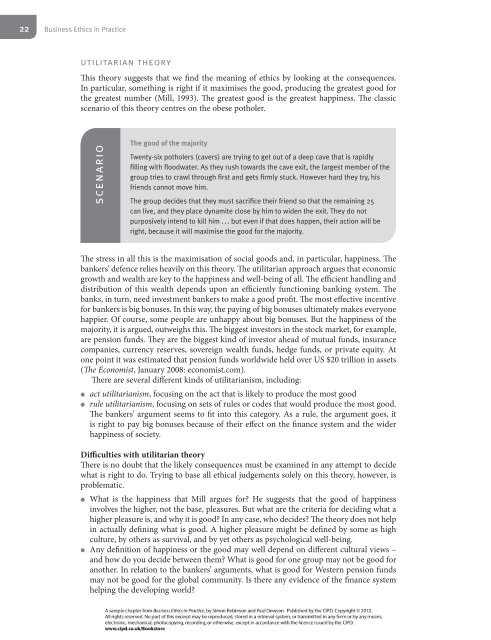normative Ethical theory - CIPD
normative Ethical theory - CIPD
normative Ethical theory - CIPD
Create successful ePaper yourself
Turn your PDF publications into a flip-book with our unique Google optimized e-Paper software.
22Business Ethics in Practiceutilitarian <strong>theory</strong>This <strong>theory</strong> suggests that we find the meaning of ethics by looking at the consequences.In particular, something is right if it maximises the good, producing the greatest good forthe greatest number (Mill, 1993). The greatest good is the greatest happiness. The classicscenario of this <strong>theory</strong> centres on the obese potholer.scenarioThe good of the majorityTwenty-six potholers (cavers) are trying to get out of a deep cave that is rapidlyfilling with floodwater. As they rush towards the cave exit, the largest member of thegroup tries to crawl through first and gets firmly stuck. However hard they try, hisfriends cannot move him.The group decides that they must sacrifice their friend so that the remaining 25can live, and they place dynamite close by him to widen the exit. They do notpurposively intend to kill him . . . but even if that does happen, their action will beright, because it will maximise the good for the majority.The stress in all this is the maximisation of social goods and, in particular, happiness. Thebankers’ defence relies heavily on this <strong>theory</strong>. The utilitarian approach argues that economicgrowth and wealth are key to the happiness and well-being of all. The efficient handling anddistribution of this wealth depends upon an efficiently functioning banking system. Thebanks, in turn, need investment bankers to make a good profit. The most effective incentivefor bankers is big bonuses. In this way, the paying of big bonuses ultimately makes everyonehappier. Of course, some people are unhappy about big bonuses. But the happiness of themajority, it is argued, outweighs this. The biggest investors in the stock market, for example,are pension funds. They are the biggest kind of investor ahead of mutual funds, insurancecompanies, currency reserves, sovereign wealth funds, hedge funds, or private equity. Atone point it was estimated that pension funds worldwide held over US $20 trillion in assets(The Economist, January 2008: economist.com).There are several different kinds of utilitarianism, including:●●●●act utilitarianism, focusing on the act that is likely to produce the most goodrule utilitarianism, focusing on sets of rules or codes that would produce the most good.The bankers’ argument seems to fit into this category. As a rule, the argument goes, itis right to pay big bonuses because of their effect on the finance system and the widerhappiness of society.Difficulties with utilitarian <strong>theory</strong>There is no doubt that the likely consequences must be examined in any attempt to decidewhat is right to do. Trying to base all ethical judgements solely on this <strong>theory</strong>, however, isproblematic.●●What is the happiness that Mill argues for? He suggests that the good of happinessinvolves the higher, not the base, pleasures. But what are the criteria for deciding what ahigher pleasure is, and why it is good? In any case, who decides? The <strong>theory</strong> does not helpin actually defining what is good. A higher pleasure might be defined by some as highculture, by others as survival, and by yet others as psychological well-being.●●Any definition of happiness or the good may well depend on different cultural views –and how do you decide between them? What is good for one group may not be good foranother. In relation to the bankers’ arguments, what is good for Western pension fundsmay not be good for the global community. Is there any evidence of the finance systemhelping the developing world?

















